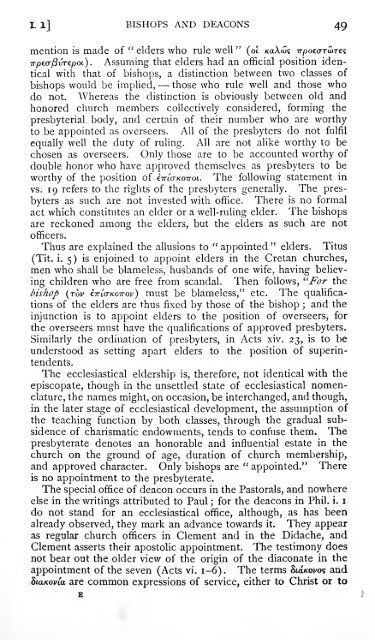Philippians and Philemon - MR Vincent - 1906.pdf
Philippians and Philemon - MR Vincent - 1906.pdf
Philippians and Philemon - MR Vincent - 1906.pdf
Create successful ePaper yourself
Turn your PDF publications into a flip-book with our unique Google optimized e-Paper software.
I. ] BISHOPS AND DEACONS 49<br />
mention is made of "elders who rule well" (oi<br />
Assuming that elders had an official -). position identical<br />
with that of bishops, a distinction between two classes of<br />
bishops would be implied, — those who rule well <strong>and</strong> those who<br />
do not. Whereas the distinction is obviously between old <strong>and</strong><br />
honored church members collectively considered, forming the<br />
presbyterial body, <strong>and</strong> certain of their number who are worthy<br />
to be appointed as overseers. All of the presbyters do not fulfil<br />
equally well the duty of ruling. All are not alike worthy to be<br />
chosen as overseers. Only those are to be accounted worthy of<br />
double honor who have approved themselves as presbyters to be<br />
worthy of the position of. The following statement in<br />
vs. 19 refers to the rights of the presbyters generally. The presbyters<br />
as such are not invested with office. There is no formal<br />
act which constitutes an elder or a well-ruHng elder. The bishops<br />
are reckoned among the elders, but the elders as such are not<br />
officers.<br />
Thus are explained the allusions to " appointed " elders. Titus<br />
(Tit. i. 5) is enjoined to appoint elders in the Cretan churches,<br />
men who shall be blameless, husb<strong>and</strong>s of one wife, having believing<br />
children who are free from sc<strong>and</strong>al. Then follows, "J^or the<br />
bishop { -) must be blameless," etc. The qualifications<br />
of the elders are thus fixed by those of the bishop ; <strong>and</strong> the<br />
injunction is to appoint elders to the position of overseers, for<br />
the overseers must have the qualifications of approved presbyters.<br />
Similarly the ordination of presbyters, in Acts xiv. 23, is to be<br />
understood as setting apart elders to the position of superintendents.<br />
The ecclesiastical eldership is, therefore, not identical with the<br />
episcopate, though in the unsettled state of ecclesiastical nomenclature,<br />
the names might, on occasion, be interchanged, <strong>and</strong> though,<br />
in the later stage of ecclesiastical development, the assumption of<br />
the teaching function by both classes, through the gradual subsidence<br />
of charismatic endowments, tends to confuse them. The<br />
presbyterate denotes an honorable <strong>and</strong> influential estate in the<br />
church on the ground of age, duration of church membership,<br />
<strong>and</strong> approved character. Only bishops are " appointed." There<br />
is no appointment to the presbyterate.<br />
The special office of deacon occurs in the Pastorals, <strong>and</strong> nowhere<br />
else in the writings attributed to Paul \ for the deacons in Phil. i. i<br />
do not st<strong>and</strong> for an ecclesiastical office, although, as has been<br />
already observed, they mark an advance towards it. They appear<br />
as regular church officers in Clement <strong>and</strong> in the Didache, <strong>and</strong><br />
Clement asserts their apostolic appointment. The testimony does<br />
not bear out the older view of the origin of the diaconate in the<br />
appointment of the seven (Acts vi. 1-6). The terms <strong>and</strong><br />
are common expressions of service, either to Christ or to





